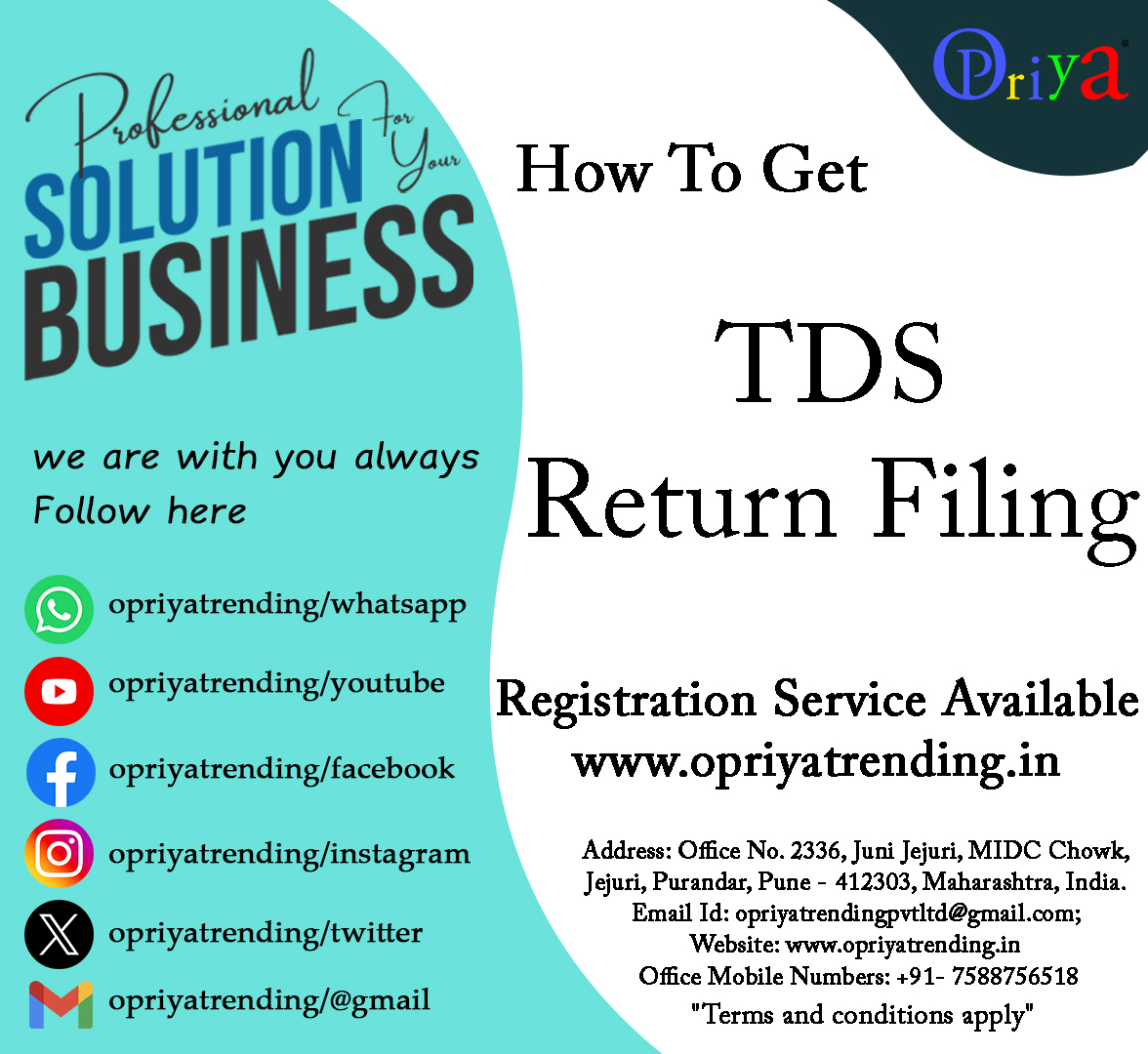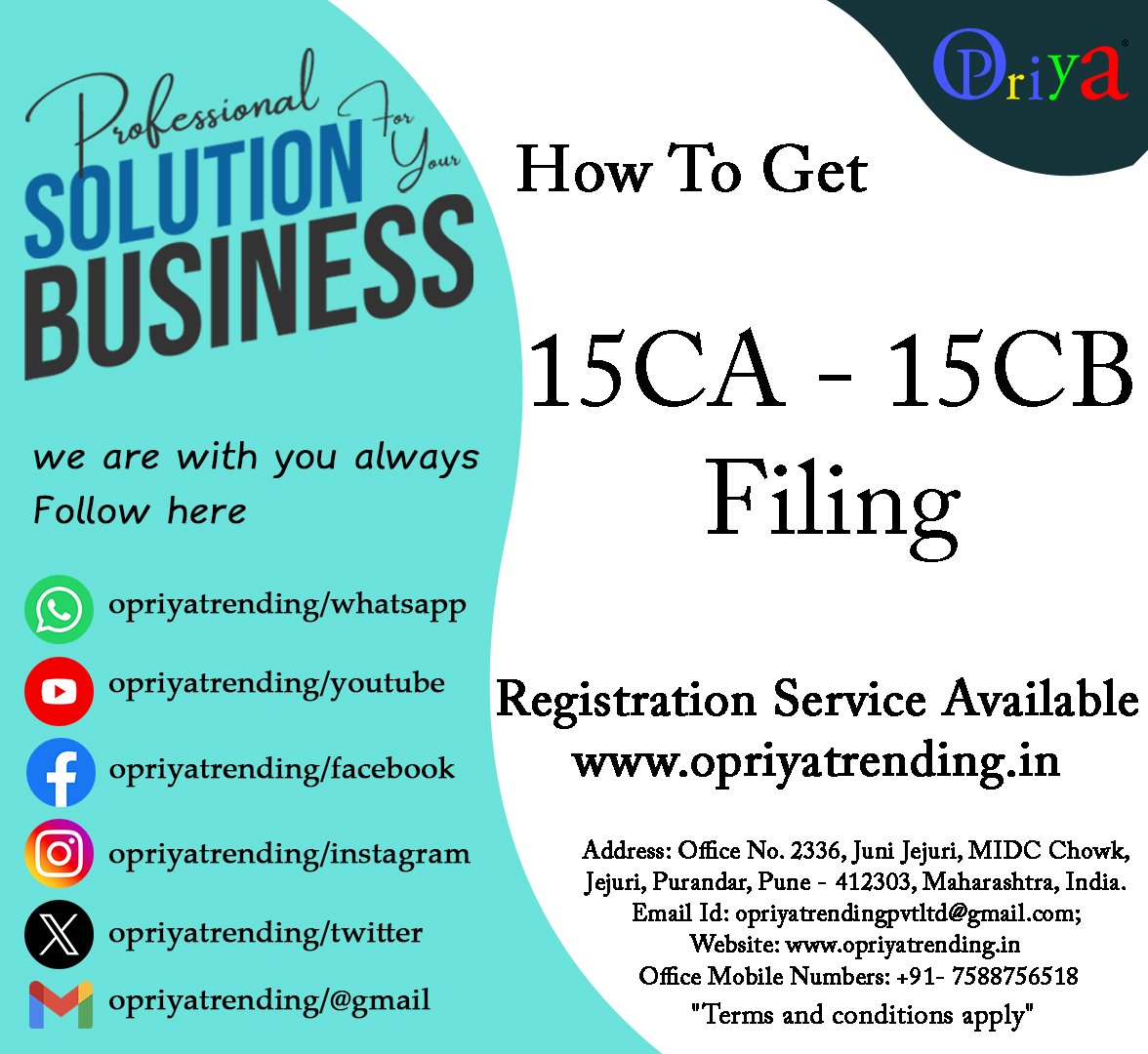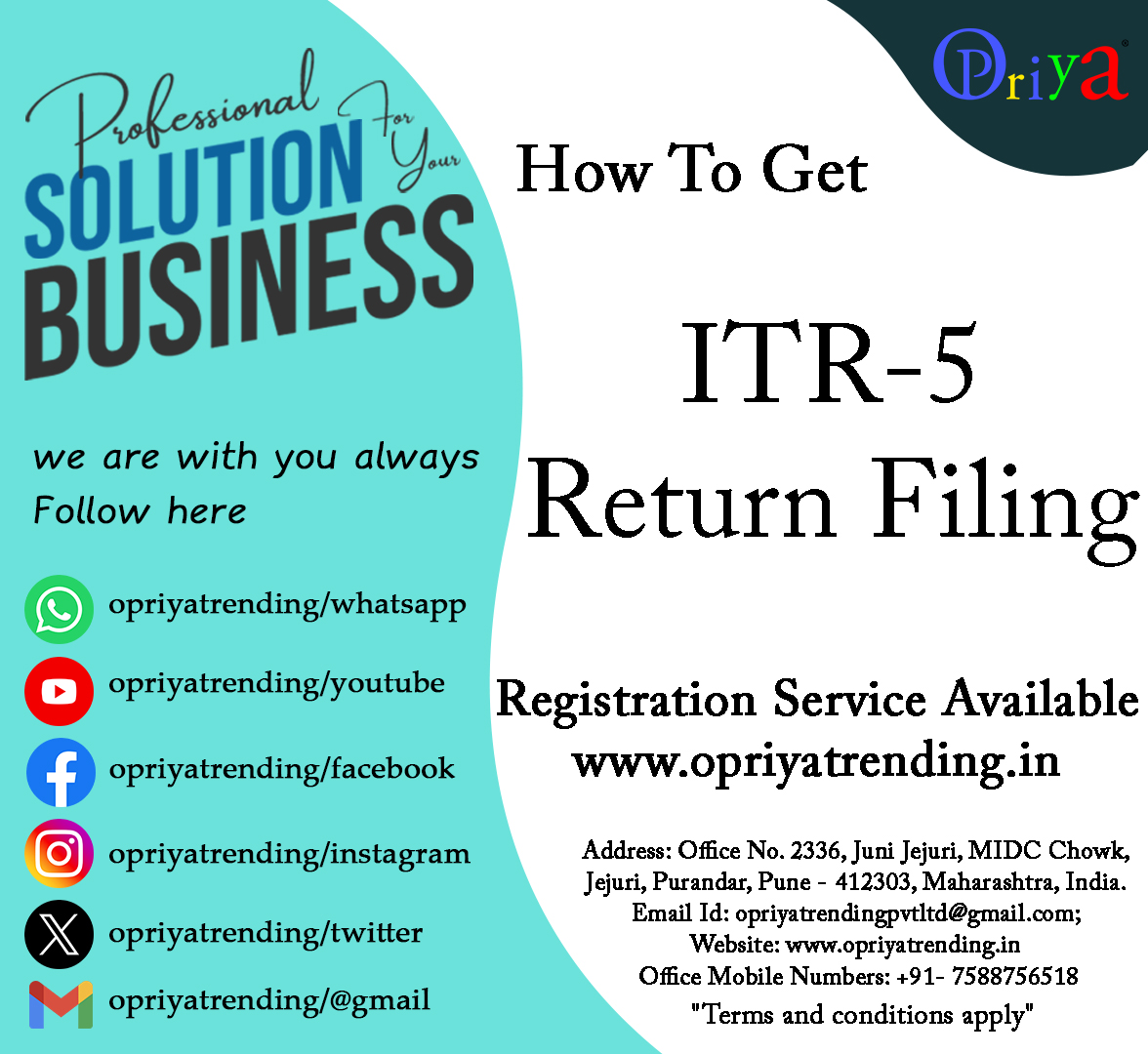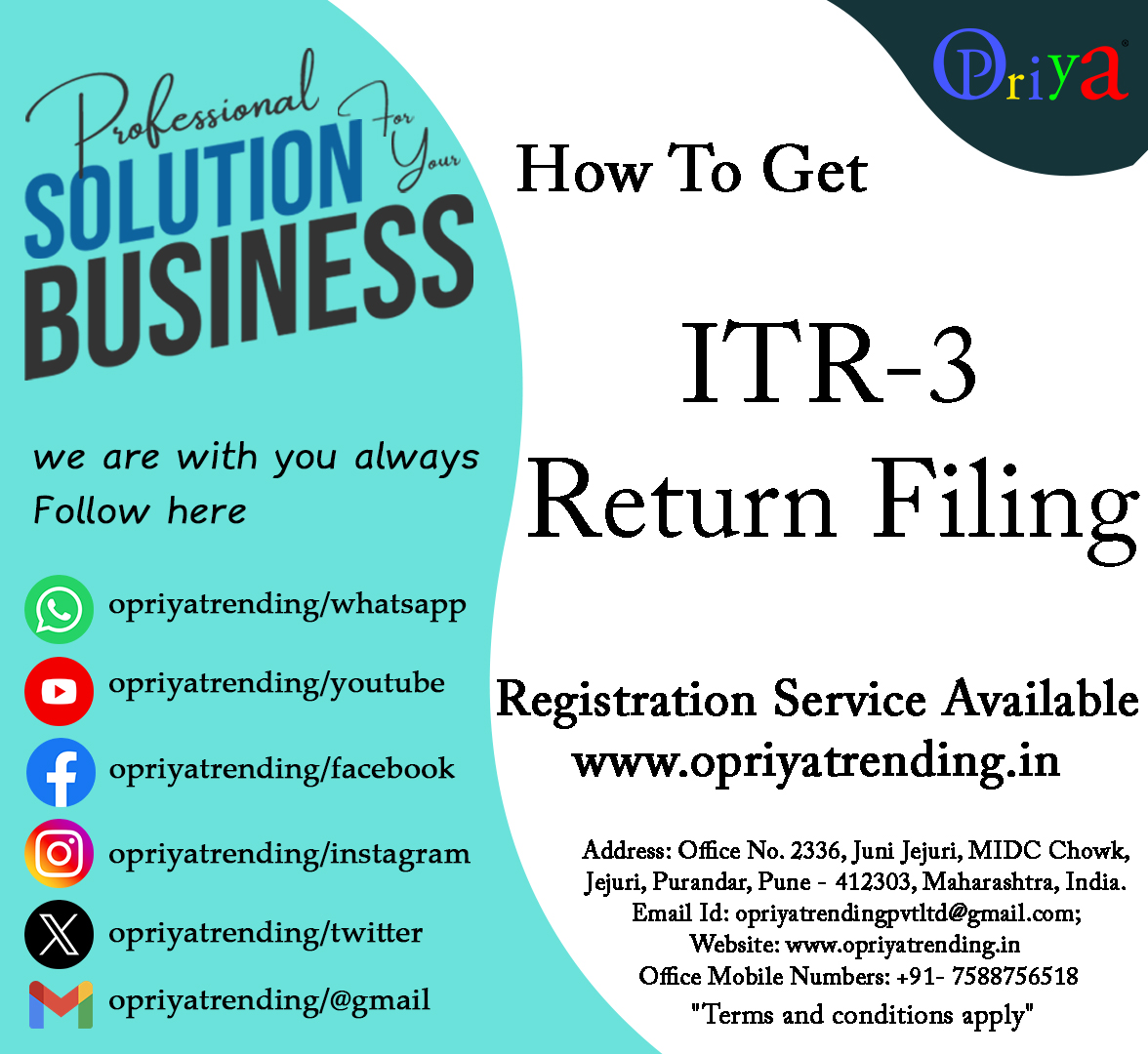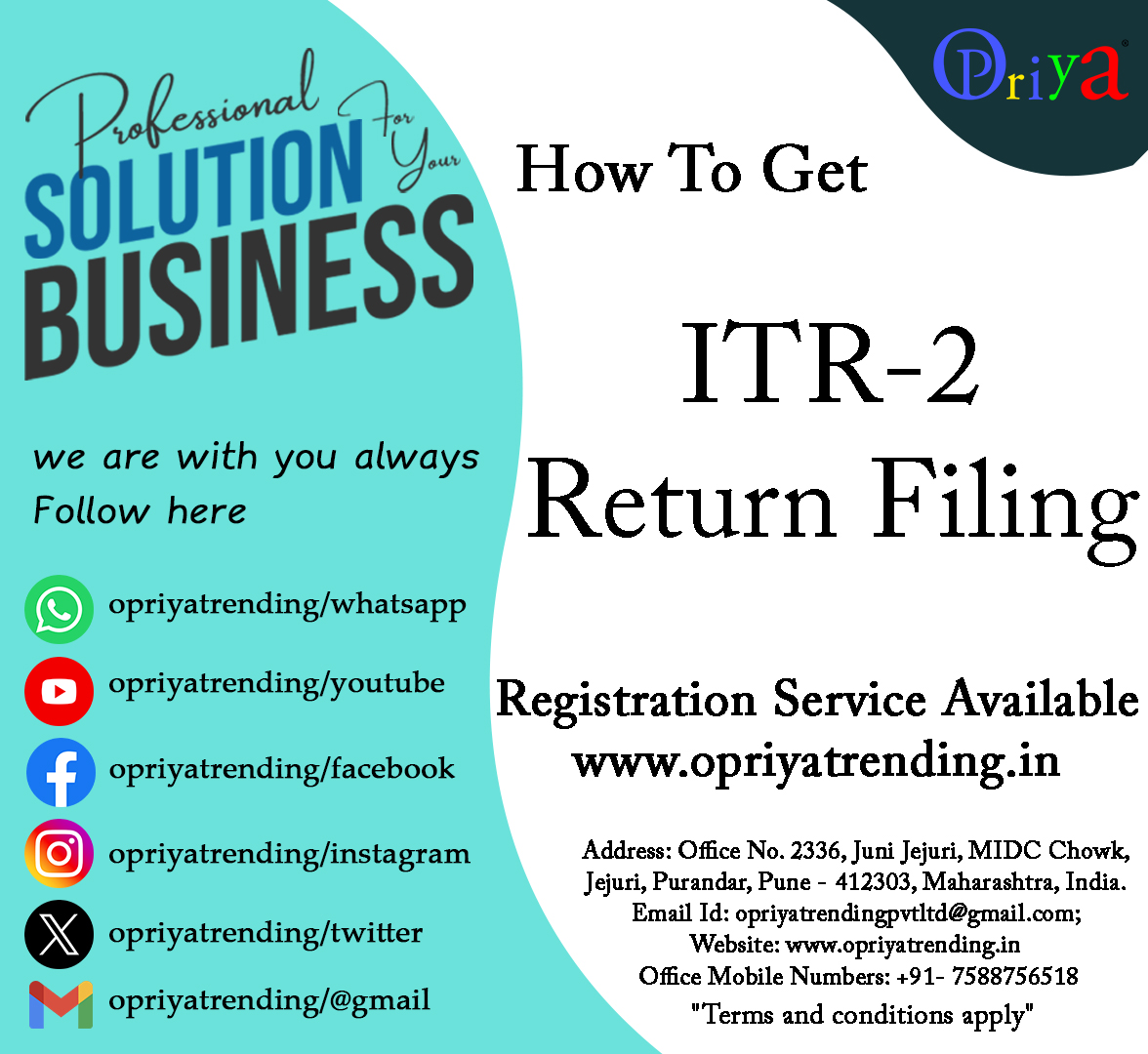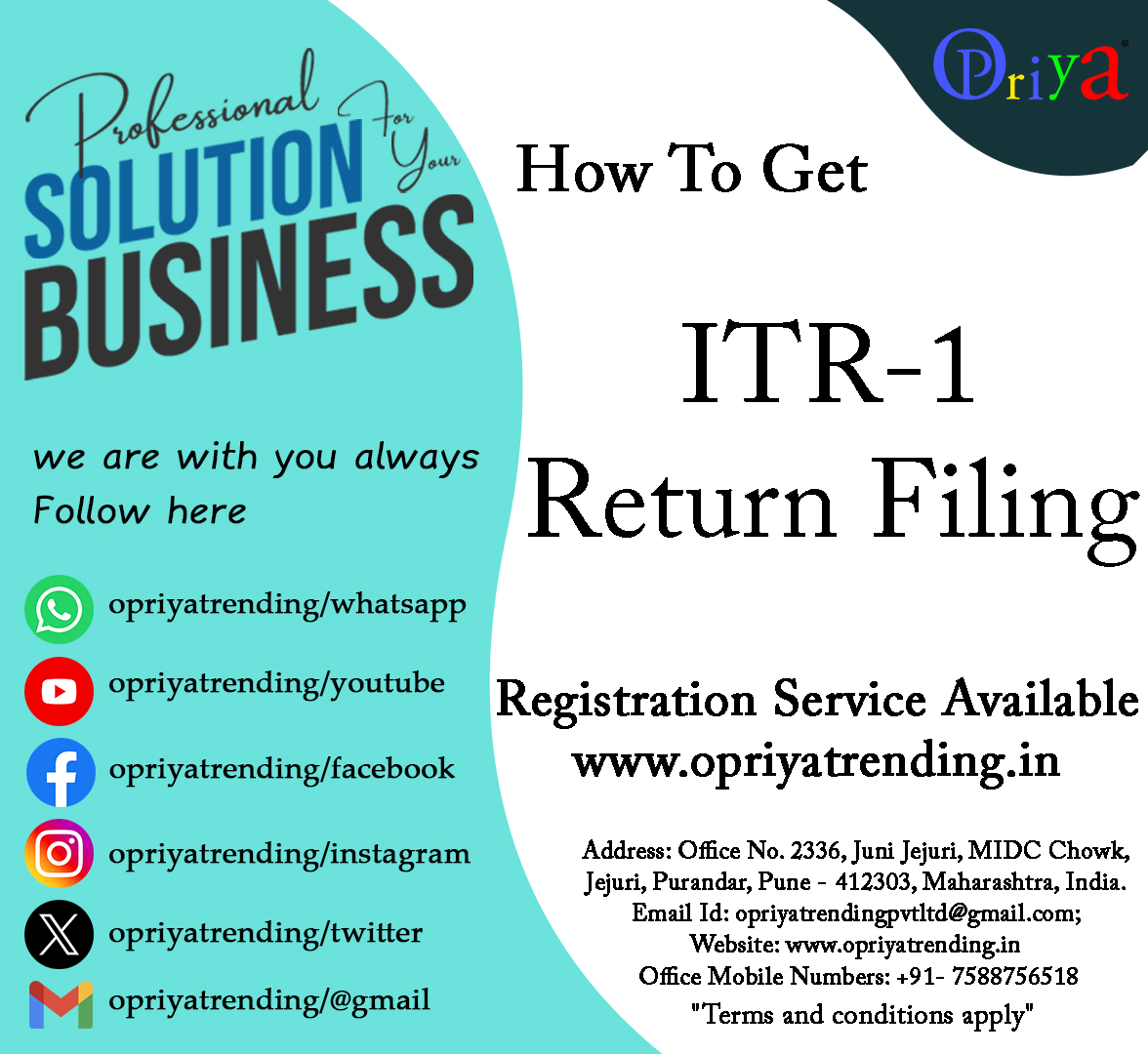ITR-7 Return Filing
Table of Contents
📌 ITR-7 Return Filing
ITR-7 Return Filing is a mandatory income tax return filing process for specific entities like trusts, political parties, research institutions, and universities under sections 139(4A) to 139(4D) of the Income Tax Act, 1961. Organizations covered under this category do not operate for profit and must report their income and expenditure to the Income Tax Department in the prescribed form. The correct and timely ITR-7 Return Filing ensures compliance with legal obligations and avoids penalties or disqualifications from exemptions.
With the changing tax norms and digital filing procedures, navigating ITR-7 Return Filing can be complex. That’s where O’Priya Trading Pvt Ltd comes in — we help simplify, guide, and execute your ITR-7 Return Filing with unmatched precision. This service is crucial for NGOs, educational and religious institutions, and political parties that seek exemption under the Income Tax Act.
🔍 Types of ITR-7 Return Filing Categories (As Per Income Tax Act)
Entities eligible or mandated to file ITR-7 Return Filing do so under specific sub-sections of Section 139. Here’s a breakdown:
1. Section 139(4A):
Applicable to trusts and religious or charitable institutions claiming exemptions under Section 11 and 12.
2. Section 139(4B):
Specific to political parties, if total income exceeds the non-taxable threshold.
3. Section 139(4C):
Applicable to institutions like:
- Scientific research associations (Section 10(21))
- News agencies (Section 10(22B))
- Educational institutions (Section 10(23C))
4. Section 139(4D):
For colleges, universities, or other educational institutions not required to furnish return under other provisions.
Each of these categories has unique reporting criteria, schedules, and attachments within ITR-7 Return Filing. Selecting the correct section is vital for valid submission.
👥 Who Needs ITR-7 Return Filing Services?
ITR-7 Return Filing is specifically meant for non-profit and public welfare entities. Examples include:
- Charitable Trusts: NGOs working in education, health, or rural development.
- Political Parties: Must file returns if gross income exceeds basic exemption.
- Universities & Colleges: Including public and privately managed institutions.
- Research Institutions: Organizations engaged in scientific or social studies.
- Associations: Working towards socio-economic causes, often exempt under specific sections.
If you’re unsure whether your organization is required to file ITR-7 Return Filing, O’Priya Trading Pvt Ltd can evaluate your case and provide clarity with compliance advice.
🌟 Why Choose O’Priya Trading Pvt Ltd for ITR-7 Return Filing?
When it comes to ITR-7 Return Filing, expertise matters. Here’s why clients trust O’Priya Trading Pvt Ltd:
- ✅ Specialized Knowledge: We have in-depth experience in filing returns for charitable trusts, universities, and political parties.
- ✅ Document Management: We help compile, verify, and attach the correct schedules and documentation.
- ✅ Accuracy & Compliance: Avoid rejections and scrutiny with our error-free filing process.
- ✅ Speed: Get your returns filed quickly and well before deadlines.
- ✅ Dedicated Support: 1-on-1 service with tax experts guiding you through each step.
With over 10 years of experience, 500+ satisfied clients, and 99% on-time filing, O’Priya Trading Pvt Ltd is your trusted ally for hassle-free ITR-7 Return Filing.
🧾 Registration Process for ITR-7 Return Filing
The ITR-7 Return Filing procedure involves multiple steps that require meticulous planning:
Step 1: Eligibility Assessment
We first determine whether your entity falls under Section 139(4A), 4B, 4C, or 4D.
Step 2: Document Collection
We collect and verify documents such as income and expenditure statements, 80G registration certificates, 12A/12AA registration, audit reports, etc.
Step 3: Digital Signature Certificate (DSC)
Mandatory for electronic filing. We assist in generating or renewing your DSC.
Step 4: Prepare ITR-7 Form
We fill out applicable sections and schedules. This includes:
- Schedule AI: Aggregate income
- Schedule ER: Revenue details
- Schedule LA: Details of loans
Step 5: Attachments
We attach audit reports in Form 10B and supporting documents.
Step 6: Filing on Income Tax Portal
We e-file the form using DSC and confirm acknowledgment.
Step 7: Post-Filing Follow-Up
We monitor for notices, mismatches, and ensure processing without errors.
Let O’Priya Trading Pvt Ltd handle every step of your ITR-7 Return Filing, so you stay focused on your mission.
📂 Required Documents for ITR-7 Return Filing
Here’s what you need to provide for ITR-7 Return Filing:
- PAN of the Institution
- 12A / 12AA / 80G Certificate
- Income & Expenditure Statement
- Balance Sheet & Audit Report (Form 10B)
- Bank Account Details
- Donation Details with Receipts
- DSC (Digital Signature Certificate)
- Trust Deed / Registration Certificate
- TDS Certificates (Form 16A if applicable)
Proper documentation is key to seamless ITR-7 Return Filing. We help compile, review, and structure these documents in the required formats.
💸 Cost Involved in ITR-7 Return Filing
O’Priya Trading Pvt Ltd offers transparent and affordable pricing:
- ✔ Basic ITR-7 Filing: ₹5,999/-
- ✔ Filing with Audit Report: ₹7,999/-
- ✔ Complex Filing (Political Party/Multiple Trusts): ₹9,999/-
No hidden charges. Custom packages available for NGOs or institutions with multiple branches. Your ITR-7 Return Filing is worth every rupee invested.
💰 Payment Refund Policy
30 Days Money Back Guarantee – No Refund on Filed Cases
We ensure 100% satisfaction for ITR-7 Return Filing services. However:
- Once your return is filed, payment is non-refundable.
- If services remain unused for 30 days, you may request a full refund.
We maintain transparency to build long-term trust.
📃 Terms and Policy
By opting for ITR-7 Return Filing services via O’Priya Trading Pvt Ltd, you agree to:
- Share accurate, verifiable data
- Use genuine DSC credentials
- Accept legal liability for content accuracy
We never share your data without consent and comply fully with India’s IT laws.
⏱️ Time Taken for ITR-7 Return Filing
ITR-7 Return Filing usually takes:
- Basic Filing: 3–5 working days
- With Audit: 7–10 days
- Complex Case: 10–15 days
Timelines vary depending on document availability and assessment completion.
⚠️ Common Mistakes to Avoid in ITR-7 Return Filing
Avoid these costly errors:
- ❌ Wrong section selection under 139(4A-D)
- ❌ Missing audit reports or incorrect Form 10B
- ❌ DSC errors while filing
- ❌ Failure to report donations and grants
- ❌ Submitting without PAN verification
These mistakes can result in penalties, rejection, or loss of exemption status. With O’Priya Trading Pvt Ltd, you avoid them all and file with confidence.
📞 Call-to-Action
Ready to file your ITR-7 Return Filing? Contact us now!
📧 Email: opriyatrendingpvtltd@gmail.com
📱 WhatsApp: Click to Chat
🌐 Visit: opriyatrending.in
👍 Facebook: O’Priya Trading Pvt Ltd
✨ Let’s simplify your ITR-7 Return Filing together!
❓ Frequently Asked Questions (FAQs)
1. Who should file ITR-7 Return?
Organizations claiming exemption under sections 11, 12, 10(23C), political parties, and educational institutions must file ITR-7.
2. Is DSC mandatory for ITR-7 Return Filing?
Yes, a Digital Signature Certificate is mandatory for e-filing ITR-7.
3. What is the due date for ITR-7?
Typically, 31st October of the assessment year. Extensions may apply in special cases.
4. What happens if I miss the ITR-7 deadline?
Late filing attracts penalties under section 234F and may affect exemption status.
5. Can a CA file ITR-7 on behalf of the organization?
Yes, registered Chartered Accountants can file ITR-7 on your behalf.
6. Can I file ITR-7 myself?
Yes, if you’re confident. But it’s better to consult experts like O’Priya Trading Pvt Ltd.
7. What is Form 10B?
Form 10B is an audit report for trusts and institutions claiming exemptions under Section 11 and 12.
8. Are political parties also covered under ITR-7?
Yes, under Section 139(4B) if total income exceeds basic exemption limit.
9. Is manual submission of ITR-7 allowed?
No, ITR-7 must be filed online using a valid DSC.
10. What if I made a mistake after filing ITR-7?
You can revise your return before the end of the assessment year.
O’Priya Trading Private Limited: All India License Registration Service Provider
In today’s complex regulatory landscape, obtaining licenses and regulatory approvals in India has become more essential than ever for businesses, institutions, and individuals. Whether it’s an arms license, FSSAI registration, company incorporation, or compliance with the latest government norms, having the right license determines your legitimacy, credibility, and operational capacity.
One company leading this transformation by providing seamless, reliable, and legally compliant license registration services across India is O’Priya Trading Private Limited. With a strong commitment to transparency, process efficiency, and client satisfaction, O’Priya Trading Pvt. Ltd. has emerged as a trusted name in the Indian licensing domain.
🔷 Company Overview
Legal Name: O’Priya Trading Private Limited
Nature of Business: License Registration, Compliance Advisory, Government Liaison Services
Operational Scale: Pan-India
Head Office: Registered in India, with service availability across all states and union territories
📞 Call-to-Action (CTA) – Apply Now with Confidence!
Ready to secure your Licence Apply with Full Confidence in All Indiaa?
📧 Email: opriyatrendingpvtltd@gmail.com
📱 WhatsApp: Click to Chat
🌐 Visit: opriyatrending.in
👍 Facebook: O’Priya Trading Pvt Ltd
Apply with Full Confidence in 2025.
🏛️ What Does O’Priya Trading Pvt Ltd Do?
O’Priya Trading Private Limited specializes in license registration services across India, offering a full range of end-to-end solutions to institutions, businesses, and individuals seeking regulatory permissions and licenses. From document preparation to submission, legal verification, and post-approval compliance, they serve as a single-window license consultancy provider.
🗺️ Pan-India Service Coverage
What makes O’Priya Trading unique is its all-India licensing facilitation network. Unlike regional agencies that operate within narrow jurisdictions, O’Priya has built an operational capacity to deliver services in every Indian state and union territory.
🌍 States Served Include:
- Delhi, Maharashtra, Uttar Pradesh, Gujarat, Rajasthan, Madhya Pradesh, Karnataka, Tamil Nadu, Kerala, Telangana, Punjab, Haryana, Assam, West Bengal, Bihar, Jharkhand, Odisha, Chhattisgarh, and more.
🏢 Cities with Active Clients:
- Mumbai, Pune, Delhi, Hyderabad, Bangalore, Kolkata, Ahmedabad, Chennai, Jaipur, Lucknow, Bhopal, Indore, Surat, Patna, and others.
Through a digital-first approach, coupled with experienced local legal liaisons, O’Priya ensures consistency in documentation, faster government approvals, and responsive client support.
💡 Why Clients Trust O’Priya Trading Pvt Ltd
1. ✅ Transparency & Ethics
🔒 100% Transparent | No Hidden Fees | Pan-India Services We believe in:
- Clear timelines
- Upfront pricing
- Honesty about payment policies (non-refundable, refundable, no surprises)
- Total confidentiality
2. 🧾 Documentation Expertise
Most license applications are delayed due to incomplete, incorrect, or improperly formatted documents. O’Priya’s legal consultants help you prepare foolproof documentation as per the latest formats demanded by regulatory bodies.
3. 🧑⚖️ Government Liaison
Whether it’s a district magistrate’s office, arms licensing authority, food safety department, or ROC office, O’Priya has built solid working relationships with relevant departments across states.
4. 🚀 Quick Turnaround
With strong process knowledge and digital tools, O’Priya delivers faster application submissions, consistent follow-ups, and streamlined approvals—ensuring minimal disruption to your business.
5. 💬 Client-Centric Support
They offer multi-channel communication: WhatsApp, email, video calls, and in some cases, in-person assistance. Clients are never left guessing about the status of their application.
📂 Service Flow: How It Works
Step 1: Free Consultation
Client reaches out via WhatsApp or email. A dedicated case manager responds with guidance and documentation checklist.
Step 2: Document Compilation
The team helps the client gather and format all required documents—identities, justifications, organizational registrations, etc.
Step 3: Application Filing
Forms are filled and submitted either physically or digitally, depending on the department’s workflow.
Step 4: Verification Support
Whether it’s a police inquiry or local office inspection, the team ensures you’re prepared and compliant.
Step 5: Approval & Delivery
Once approved, the license or certificate is collected and shared with the client via secure channels. Renewals and annual compliances are also managed, if opted for.
🔍 Industries Served
| Industry | Licenses Provided |
| Security | PSARA, Arms License |
| Food & Beverages | FSSAI, Shop Act, GST |
| Manufacturing | Factory License, Pollution NOC |
| Healthcare | Drug License, Biomedical Waste License |
| Retail & E-commerce | GST, MSME, Trademark |
| Education/Training | Arms License (Training), ISO, Accreditation support |
This industry-specific approach helps clients get exactly what they need—no more, no less.
📊 Success Metrics (As of 2025)
- ✅ 4,000+ Licenses Approved
- ✅ 95% Success Rate on First Submissions
- ✅ 100+ Cities Served
- ✅ 40+ License Categories Covered
- ✅ 500+ Institutional Arms Licenses Facilitated
🔄 Annual Compliance Services
Beyond just registration, O’Priya also offers post-licensing support, such as:
- Annual license renewals
- Change of address or ownership updates
- Firearms inspection audit preparation
- Document maintenance and digital filing
- Regulatory upgrades (as per rule changes)
This holistic approach ensures clients remain compliant even after license issuance.
📌 Why Choose O’Priya Over Others?
| Feature | O’Priya Trading Pvt Ltd | Typical Local Agent |
| Service Reach | Pan-India | Limited to district/state |
| Process Transparency | High (With Updates) | Often vague or hidden |
| Legal Expertise | Qualified Advisors | Informal guidance |
| Communication | Email, WhatsApp, Call | Mostly phone |
| Refund/Policy Clarity | Documented Terms | Unclear or non-existent |
| Renewal Reminders | Included | Rarely provided |
For businesses and institutions who cannot afford non-compliance or delays, O’Priya offers institutional-grade service quality at competitive prices.
🧭 Vision and Future Outlook
O’Priya Trading Pvt Ltd envisions becoming India’s most trusted regulatory compliance partner. With ongoing investments in:
- AI-based document automation
- Online dashboards for tracking license status
- Partnerships with regional lawyers and consultants
- Digital KYC and identity verification tools
…they aim to make India’s license ecosystem simpler, faster, and corruption-free.
Call-to-Action (CTA) – Apply Now with Confidence!
Ready to secure your Licence Apply with Full Confidence in All Indiaa?
👉 Contact Us Today!
📧 Email: opriyatrendingpvtltd@gmail.com
📱 WhatsApp: Click to Chat
🌐 Visit: opriyatrending.in
👍 Facebook: O’Priya Trading Pvt Ltd
Apply with Full Confidence in 2025.
🛡️ Legal. Reliable. Fast. That’s the O’Priya Promise.
📋 List of Services (with Reconstructed Links)
Below is the categorized list of services as per the website’s usage index. Where possible, we’ve added direct or pattern-based links.
1. Arms License Services
- Arms for Individual License Registration
- Arms for Institution License Registration
- Arms for Sports License Registration
- Arms for Dealers License Registration
- Weapons Manufacturing License Registration
2. AYUSH License
- AYUSH Loan & Others License
- AYUSH Manufacturing License
- AYUSH Distribution License
- AYUSH Clinic License
- AYUSH Retail License
3. BIS/ISI/ISO Certifications
4. Compulsory Registrations
- MSME/Udyam Registration
- Startup India Registration
- FSSAI Registration (Central/State)
- Legal Entity Identifier Code
- Trade License
- Fire License
- Digital Signature
- ICEGATE Registration
- FCRA Registration
- 80G and 12A Registration
5. DOT/Telecom Licenses
- ISP License
- NLD/ILD License
- UL VNO License
- PM-WANI Registration
- SACFA Clearance
- IP-1 Registration
- TEC Certificate
- AGR Return Filing
6. Drug License
7. Electrical License
8. GST & Taxation
9. IPR Services (Trademark, Copyright, Patent)
- Trademark Registration
- Trademark Objection Reply
- Patent Filing (Provisional/Complete)
- Copyright Registration
- Design Registration
10. Liquor License
11. MCA Services
- Private Limited Company Registration
- LLP Registration
- OPC Registration
- Annual MCA Compliance
- Company Closure
12. PESO License
13. PSARA License
14. Pollution Control
15. Regulatory Bodies
- NBFC Registration (RBI)
- FFMC & P2P Lending
- Legal Metrology Packager License
- IRDAI Corporate Agent License
📞 Contact O’Priya Trading Pvt Ltd Today
👉 Contact Us Today!
📧 Email: opriyatrendingpvtltd@gmail.com
📱 WhatsApp: Click to Chat
🌐 Visit: opriyatrending.in
👍 Facebook: O’Priya Trading Pvt Ltd
🛡️ Legal. Reliable. Fast. That’s the O’Priya Promise.
💖 Why opriyatrending.in is More Than Just a Service Platform
In a country as vast and complex as India, navigating government registrations can feel overwhelming, stressful, and even hopeless at times. But opriyatrending.in doesn’t just offer “services.” It offers reassurance, clarity, and a sense of control—when you need it most.
🛑 The Fear of Rejection, Delays, and Loss
You might have tried applying for licenses yourself before—endless documents, non-responsive departments, confusing portals. It can leave you feeling:
- ❌ Lost in bureaucracy
- ❌ Afraid your business will never take off
- ❌ Unsure who to trust
O’Priya Trading Pvt. Ltd. understands this fear—and fights it by giving you the guidance you were never offered before.
💪 A Partner in Your Growth Journey
Whether you’re a dreamer starting your first startup, a farmer protecting your land, a doctor opening a clinic, or a dealer building your future—this company walks beside you.
- They help you register your identity
- They protect your investment
- They stand between you and the wall of red tape
When opriyatrending.in helps you get your license, they’re not just checking boxes. They’re helping you move forward with confidence.
🧠 A Calm Voice When Everything Feels Chaotic
In a system full of delays, errors, and vague processes, opriyatrending.in offers:
- 🧾 Clear documentation guidance
- 🕐 Honest timelines
- 📞 A human voice when you call or WhatsApp
When you’re in a crisis—whether it’s a license rejection or urgent compliance—they don’t ignore you. They respond. They care.
🌱 Your Dreams Deserve to Be Legal, Protected, and Empowered
Every license, every registration, every clearance—represents a life goal.
It’s your right to:
- Own a weapon for protection
- Start a small company
- Launch a new StartUp company
- Open a food business legally
- Register a company and pass it on to your children
Opriyatrending.in ensures that no dream is delayed because of red tape.
🔗 It’s Not Just a Website It’s a Lifeline.
📍 When you open opriyatrending.in, you’re not just clicking on a page.
You’re saying:
“I’m ready to take a step toward my dream, but I need help.”
And that’s exactly what O’Priya Trading Pvt. Ltd. is here for.
📞 Contact O’Priya Trading Pvt Ltd Today
👉 Contact Us Today!
📧 Email: opriyatrendingpvtltd@gmail.com
📱 WhatsApp: Click to Chat
🌐 Visit: opriyatrending.in
👍 Facebook: O’Priya Trading Pvt Ltd
🛡️ Legal. Reliable. Fast. That’s the O’Priya Promise.


